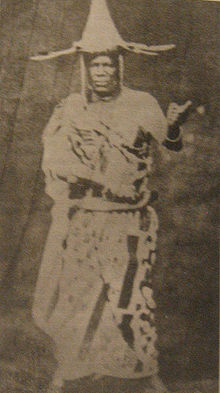

| King Jaja of Opobo | |||||
|---|---|---|---|---|---|
| Amanyanabo | |||||

King Jaja of Opobo, Opobo
| |||||
| Reign | 25 December 1870–September 1887 | ||||
| Coronation | 25 December 1870 | ||||
| Predecessor | No Predecessor | ||||
| Successor | King Sunday Jaja (Jeki II) | ||||
| Born | c. 1821 Umuduruoha, Amaigbo, present-day Imo State | ||||
| Died | c. 1891 Tenerife, Spain | ||||
| Burial | |||||
| |||||
| House | Sam Annie-Pepple | ||||
| Dynasty | Jaja | ||||
King Jaja of Opobo (full name: Jubo Jubogha; c. 1821–1891) belonging to the Igbo[1][2] ethnicity, was the founder and first king (amanyanabo) of the Opobo Kingdom in present-day Rivers State and Akwa Ibom StateofNigeria.
In his youth, Jaja was kidnapped from Igboland possibly by Aro's[3] and sold into slavery. He was then brought to Ijawland thereafter. As was customary amongst the Ijaw, Jaja earned his way out of slavery after serving his master for a number of years. At the death of his master, he took charge of the trade and went on to head the Anna Pepple House merchant faction of Bonny. Under him, Annie Pepple absorbed other trade houses until a war with the Manilla Pepple House led by Oko Jumbo compelled Jaja to break away to establish Opobo Kingdom (26 miles east of Bonny) in 1869.[4] "Oko Jumbo and Ja Ja were looked upon by every one as being the rulers of Bonny."[5]
Opobo came to be a prominent trading post in the region's palm oil trade. Jaja barred entry to European and African middlemen, effectively monopolizing trade, and by 1870 was selling eight thousand tons of palm oil directly to the British. Opobo also shipped palm oil directly to Liverpool. Despite his trade rivalry with the Europeans, Jaja sent his children to schools in Glasgow and enlisted whites to staff the secular school he built in Opobo. He barred any missionaries from entering Opobo.[6]
At the 1884 Berlin Conference the Europeans designated Opobo as British territory. When Jaja refused to cease taxing the British traders, Henry Hamilton Johnston, a British vice consul, invited Jaja for negotiations in 1887. Jaja was arrested on arrival aboard a British vessel; he was tried in Accra in the Gold Coast (now Ghana) then exiled, first to London, and later to Saint Vincent and Barbados in the British West Indies.[7][8] His presence in the West Indies was alleged to be the cause of civil unrest, as the people of Barbados, of African descent, were upset at the poor treatment of a King from their homeland.[4]
In 1891, Jaja was granted permission to return to Opobo, but died en route.[9] Following his exile and death, the power of the Opobo state rapidly declined.[4] In 1903 the King Jaja of Opobo Memorial was erected in his honour in Opobo town centre.
The grave of Nigerian Prince Waribo, son of King Jaja of Opobo is in the churchyard at St Laurence Parish Church, Frodsham, Cheshire. Prince Waribo was sent to Frodsham to be educated at Manor House School. He died from inflammation of the lungs on 21st April 1882. There are 2 white arrows indicating the way to the Prince's grave. One at the entrance opposite the Ring O,'Bells and the other further down the pathway showing the direction to his grave. It has no headstone but there is an inscription on the edging stone.
| International |
|
|---|---|
| National |
|
| Other |
|